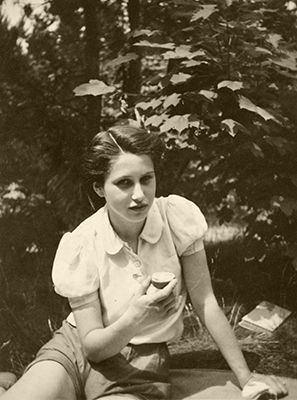
Elise Garibaldi
Elise Garibaldi had heard her grandparents’ story of falling in love while surviving the Holocaust countless times throughout her life. With her new book Roses in a Forbidden Garden: A Holocaust Love Story, that story is now being shared with the world.
Sam Berger and Inge Katz met as teenagers in Theresienstadt. Despite the harsh conditions of the camp, they fell in love and hoped for a future together – until Sam was sent to Auschwitz and they didn’t see each other again until after the war. But once they found each other again, they married, started a family and moved to New York.
Two of Sam’s siblings, Walter Berger and Helen Comite, as well as a friend, Shlomoh Schmidt, gave their testimonies to USC Shoah Foundation’s Visual History Archive. Sam gave his testimony to Yale University’s Fortunoff Video Archive for Holocaust Testimonies.
Garibaldi, who had never published a book before, was skeptical at first that she could write a book about her grandparents. But their story of love and resilience has always been such an inspiration to her that she wanted to share it with others.
“I was always very inspired by their stories of love, that love is real, that love is our greatest blessing, and not just romantic love but love for the family,” she said. “When they had nothing else, they had the dream of being together again and that really helped them get through. It was a beautiful legacy.”
Garibaldi consulted with her grandmother (Sam died in 2006) about the details of their experiences before, during and after World War II, but she knew the story practically by heart after hearing it many times.
She said it was especially meaningful for Inge to read what she had written about her family members who didn’t survive the war. Through the book, Inge felt they had come back to life.
“She would read it over and over because for those few moments they were in her life again,” Garibaldi said. “These people who would have been lost to history, that don’t even have a gravestone, I’m making them not only alive again but people will know how special they were and honor them.”

“For me personally numbers are very abstract but when somebody reaches my heart, these are things I never forget,” she said. “These are the things that change me and my hope is that is what happens [for readers]. This makes it real; these are little girls that could be your sister or cousin, or your parents.”
So far, Roses in a Forbidden Garden has already garnered attention for Sam and Inge’s story. A playwright is working on turning the book into a play and schools in New York are also looking into making the book part of their curriculum.
“This is a tremendous responsibility not only to history but to the family and honoring them the way my grandmother would like,” Garibaldi said. “This is a story that’s meant to be heard and it seems like it’s well on its way.”